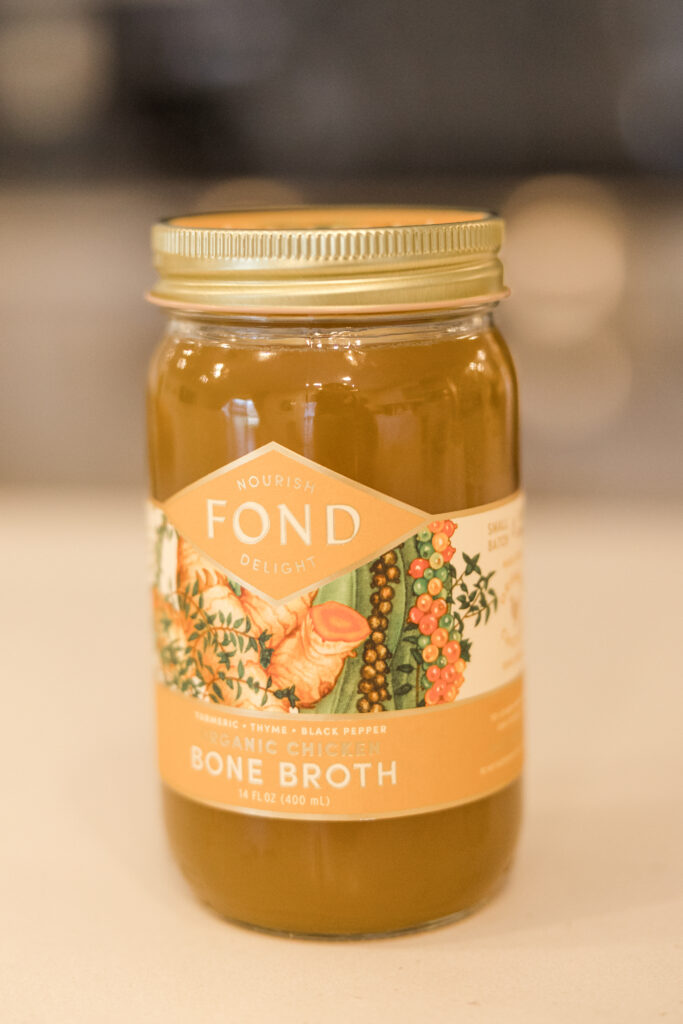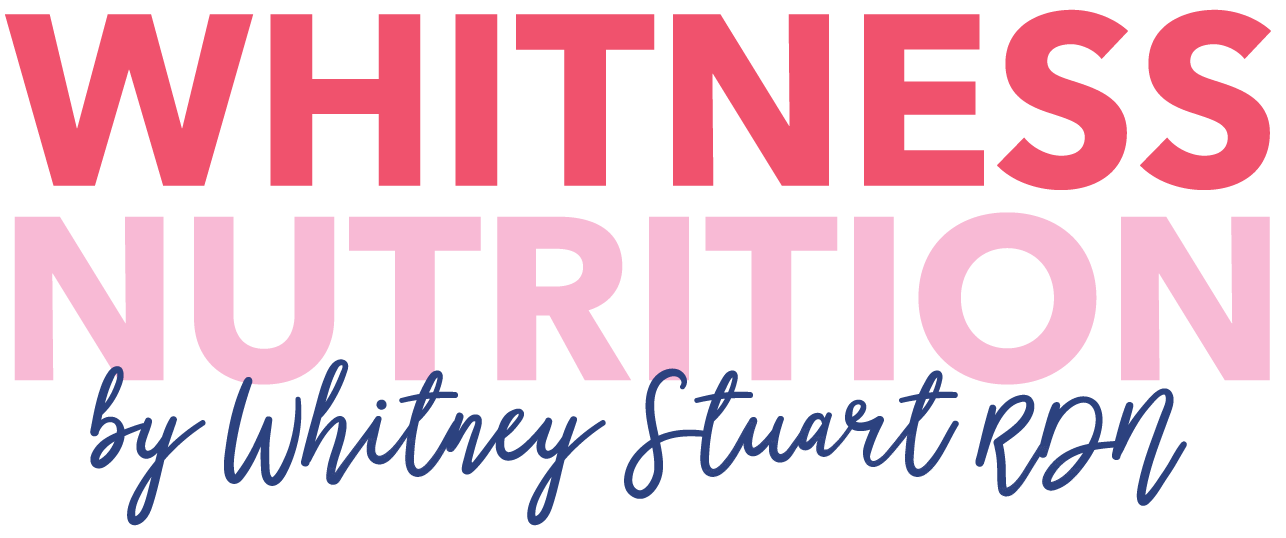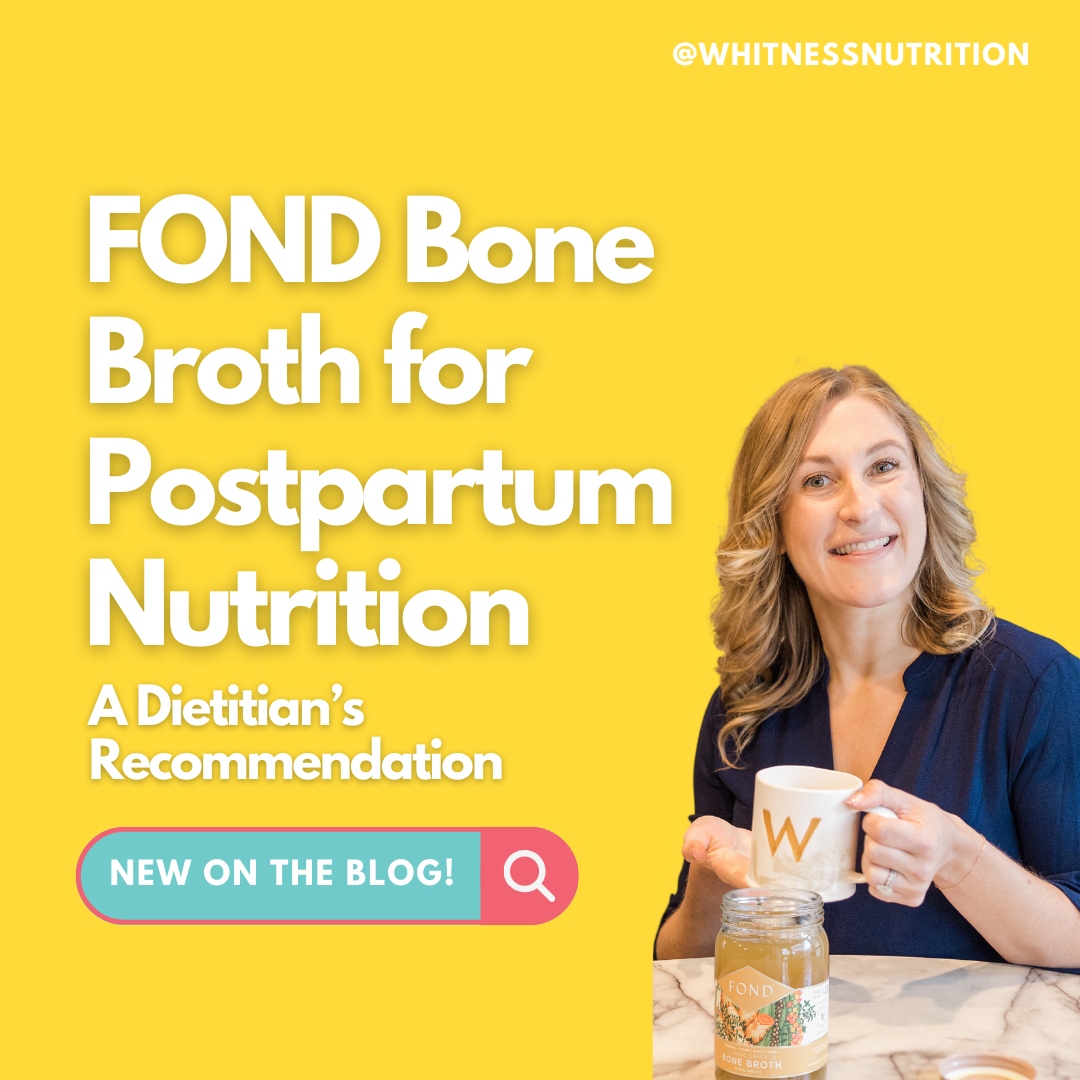A dietitians recommendation: FOND bone broth for postpartum nutrition
As a Registered Dietitian, I wanted to share more on my postpartum experience and shed some light on what postpartum can look like.I felt really prepared for labor and postpartum from all the reading I had done, nutrition prep that was in my fridge, and all the patients I had successfully helped in the past. But, my personal postpartum journey threw me for unexpected turns. And now, I’m wiser for it and of it! Experience always beats expertise when it comes to labor, in my opinion. This post was written in partnership with FOND Bone Broth to educate and empower you to learn from my mistakes and successes to best equip your own postpartum journey!
Now that I can speak from experience, I can say that I’ve never felt so simultaneously exhilarated and depleted at the same time as when I gave birth. Although I had a short labor compared to many (14 hours versus the usual range of 12-24 expected for a first birth), I was shocked at just how long it took for me to really recover. I’m talking mentally, emotionally, and most of all, physically. And this is from a nutrition expert who makes it their life to fuel themselves and others well!
Why was recovery from my home birth so difficult?
Before we dig into fueling, let’s touch on why adequate recovery from birth is so critical. Side note: Although I had a home birth, this applies to ALL births. Whether you had a baby in the hospital, a birth center, or in your car (whoops!).
- First, my organs were literally rearranged in my body. For 9 months, I carried a baby in my cervix, and in a “quick” moment, I no longer did! Giving my body time to rearrange and settle was important. Rest & support was essential to my recovery.
- My body was also preparing to provide a steady milk supply to my baby. This process is a metabolically demanding one, as milk is made from your blood supply.
- After 14 hours of labor, I had vomited 7 times and lost a safe, but significant, amount of blood. Fluid replenishment was critical! I was rotating between ice water, electrolytes, and bone broth to stay hydrated throughout the process.
- And, I was in desperate need of calories since I was unable to readily consume any for a 14 hour period of early labor. My active labor was less than 13 minutes and then took 3 pushes, but that was just for me!
Why is adequate nutrition and rest so important after giving birth?
Let’s be clear; having a baby is the most strenuous endurance exercise I have ever done. And, any birth, in any fashion, takes an extremely stressful toll on the entire body. I knew that caring for my body was of utmost importance because otherwise I was setting myself up for prolonged recovery and healing and delayed milk supply.
What I used for effective postpartum recovery and replenishment
Postpartum Meal Prep:
During the third trimester, I prepared protein-rich freezer meals that could be easily warmed once my baby arrived. I focused on paleo meals that were rich in nutrients, high in protein, low in sugar, and contained healthy fats for sustained energy.
- The Defined Dish meatballs were easy to eat and could be popped into my mouth with one hand on baby! And for a more balanced meal, I’d pair them with Banza pasta and frozen broccoli.
- I loved this Turkey Meatloaf that I cooked into muffin tins for “Meat Muffins.” I heated them up and served them with avocado and spring mix, or sometimes on a toasted hamburger bun.
- This chicken casserole was also delicious and froze well. The dietitian hack? Use bone broth in lieu of water to increase the nutrient value.
- I also just cooked up a ton of shredded chicken breasts, slow cooked in the crockpot with FOND Bone Broth. This easy protein could be made into quick lunches with a bed of greens + tasty sauce in later months, when I didn’t have a plan. Keep up with my postpartum meal hacks here!
 P.S. Consider setting up a Meal Train!
P.S. Consider setting up a Meal Train!
This saved us and also gave us an excuse to see friends while we were in the throes of sleepless nights and learning to parent. Those tiny social moments were so special. My meal train was really specific – I had a list of exactly what meals I desired and from where. And before you make a comment – this isn’t snobby! This is is what made my milk supply a success! I wasn’t going to eat inflammatory or carbohydrate heavy meals that would wreck my blood sugar and milk supply. Going in this direction allowed people who wanted to help me, help me to actually help me succeed. Plus, the meal train allowed me to diversify my diet (and babies) even more; I ordered wild salmon, shrimp, bison, and kept different vegetables in rotation with different cuisines! My go-to’s for quick nourishing meals people could graciously pick up for me were Flower Child, Eatzis and CAVA. All of which I have a #WWWO you can use!
Easy Postpartum breakfasts
We planned for my husband to create a four week paternity leave which allowed him to help keep me well-fed in those early days. You read that right; I didn’t cook or feed myself a meal for 3 weeks. Because I was constantly nursing or resting, eating meals was really difficult, and cooking said meals? A whole other ball game! This support and nourishment led to a successful and available milk supply.
Every morning, while my husband made us breakfast, I sipped on: electrolytes, bone broth, and then a cup of organic coffee with almond milk. I prioritized minerals and protein before caffeine, but I never cut out coffee completely because it’s something I enjoy! And, baby James has tolerated it fine when I keep my consumption to a minimum.
A few of our favorite breakfast meal staples included:
- Scrambled eggs with chicken sausage, sweet potato and spinach. Sometimes we swapped out the potato for paleo freezer waffles spread with Artisana almond butter.
- Spaghetti Squash with meatballs – not your typical breakfast but it got the job done!
- Toasted breakfast sandwiches with egg, avocado, vegan cheese slices and tomato. I used either Unbun or Canyon Bakehouse bagels to keep it gluten-free.
As you can tell, there was always a dense protein source and a complex carbohydrate; both essentials for a very hungry mama! And, having a big breakfast was really key for me. Not only was I most hungry in the morning after a long night of feeding every 3 hours, but I knew I was less likely to have a slow moment to eat later in the day. Once my husband went back to work I continued to eat big breakfasts because it was my greatest chance ensuring I ate enough calories that day! Once the day started, I would often get busy and single hand meals were harder to make nutrient dense.
But, let’s be real. Sometimes, a sit down meal just didn’t happen. Whether it was baby blowouts, last minute appointments or I was just too busy to sit down, I needed something quick and nourishing. That’s where my afternoon cup of broth habit came in handy! If I felt my mid-day energy levels dropping, I would heat a jar of FOND bone broth and add 1TB of olive or coconut oil for extra fat. This was a quick and easy tool to support my recovery journey, all in one hand! Use code WHITNESS to implement bone broth into your own postpartum journey!
Nutritional Benefits of Bone Broth
Why bone broth, you might ask? Honestly, I see this as a nutrient-packed, more natural protein shake. But, without the cheap filler, sweet flavor, and added sugar. But, it’s also just as easy!
- Rich Nutrient Profile: Bone broth is a valuable source of essential minerals like calcium, phosphorus, and magnesium. It also contains collagen, gelatin, and amino acids, the building blocks of proteins[^1].
- Gut-Friendly:The gelatin content in bone broth may contribute to a healthier gut lining. This could aid digestion and potentially address concerns like leaky gut syndrome[^3].
- Boosts Immune Function: Amino acids like glutamine found in bone broth might play a role in supporting the immune system and its overall function[^5].
- Essential Amino Acids: Bone broth supplies a range of amino acids crucial for muscle repair, neurotransmitter production, and hormone regulation.
- Easy Digestion:The prolonged cooking process breaks down proteins, making bone broth easier to digest compared to solid foods.
Benefits of Bone Broth for New Mama
Although I incorporate bone broth in my diet in all seasons, I specifically leaned on it during postpartum for these reasons.
- It’s rich in both collagen and protein to support the regaining of my strength after child birth.
- Bone broth is an excellent source of nutrients, hydration, and electrolytes for milk supply!
- Nutrient needs rapidly increase postpartum as a mama begins to breastfeed and bone broth contains supportive electrolytes, sodium, potassium, and magnesium that are critical for supporting a mama’s hydration status.
- Unlike other empty liquid calories, bone broth is rich in protein to support metabolic function and healthy weight loss.
Milk Supply Support
Supporting the production of breast milk, especially in the early days after giving birth, can be important for ensuring your baby’s health and well-being. Here are some tips to help support the coming in of breast milk:
- Initiate Skin-to-Skin Contact: Spend time doing skin-to-skin contact with your newborn as soon as possible after birth. This promotes bonding and can stimulate your body’s production of oxytocin, a hormone that plays a role in milk release.
- Stay Hydrated and Well-Nourished: Drink plenty of fluids and eat a balanced diet that includes nutrient-rich foods. Adequate hydration and nutrition support your body’s ability to produce milk.
- Rest and Relaxation: Get enough rest and reduce stress as much as possible. Stress can interfere with milk production, so taking time to rest and relax is important.
- Seek Support: Don’t hesitate to reach out to a lactation consultant, a breastfeeding support group, or your healthcare provider if you have concerns or questions about breastfeeding.
Remember that every mother and baby are unique, and breastfeeding experiences can vary. If you encounter challenges with milk production, don’t hesitate to seek professional guidance to ensure your baby is getting the nutrition they need.

Are you currently pregnant or looking to equip your kitchen with nutrient-rich fuel? Consider the FOND Pregnancy and Postpartum bundle. This bundle contains three different chicken bone broths that all contain nutrients to support women during pregnancy and postpartum. Plus, they’re delicious!
Stocking up on FOND bone broth was one of the best tools I utilized during my entire pregnancy! In the first trimester, I used it when nothing sounded good and I needed easy protein sources. I’d sip on bone broth first thing in the morning to ease my nausea & stabilize my blood sugar. In the third trimester, I used it to supplement my calories when my appetite was low from my building belly pressure. And, in postpartum, it provided key nutrients to catalyze my body’s recovery process and support my milk supply. Needless to say, FOND is a staple in my diet as a Registered Dietitian, business owner and new mom.
Single Hand Snacks: Easy meals for postpartum and breastfeeding
In the early days, I never fed myself. My husband spoon fed me because I was either nursing and had to focus on a strong latch with the baby. Or, I was lying in bed trying to recover from one of the most taxing experiences ever. Having easy meals that I could eat with one hand was essential when I began to feed myself and had a constant baby attached to me. If you’ve ever tried to make a sandwich while breastfeeding, you know, it’s not happening! A few snacks that I kept in my bed side table for nighttime feedings & in my diaper bag for on the go.
- Bone Broth: FOND is ready to enjoy straight out of the jar and is an easy option for new mamas with full hands. You can also put in a to-go cup with a straw for even more ease!
- Meat sticks, no nitrate or added sugars.
- Protein Bars with no refined sugar.
- DIY trail mix bites
All of these foods were calorically dense and made it easy for me to get more nutrient needs, faster, in less servings. They’re also rich in protein and fat which stabilized my blood sugar and kept me satisfied for hours.
Nutrition for Postpartum Mental Health
Nutrition plays a crucial role in supporting mental health during the postpartum period. Especially as this is when hormonal changes, sleep deprivation, and the demands of caring for a newborn can impact a new mother’s well-being. Here are some nutritional strategies to support new mom mental health in early postpartum days:
- Include sources of omega-3 fatty acids, such as fatty fish (salmon, mackerel, sardines), walnuts, flaxseeds, and chia seeds in as many meals as you can. Omega-3s are linked to improved mood and brain health. My first meal after delivery was a wild salmon dish from Flower Child.
- Consume complex carbohydrates like legumes and starchy vegetables. As the body is recovering from labor and the stress of delivery, carbohydrates provide a steady source of energy.
- Include lean protein sources at every meal to support further muscle mass loss. New moms will spend the early days sedentary and with less muscle usage. This is why maintaining appropriate protein intake can lessen the impact of muscle loss. Plus, protein rich foods contain amino acids important for neurotransmitter production and mood regulation.
- Stay adequately hydrated by drinking water throughout the day. Dehydration can impact mood and cognitive function. Add in electrolytes for extra mineral support.
- Focus on magnesium rich foods like leafy greens and nuts. Magnesium is linked to relaxation and stress reduction.
- Reduce consumption of sugary snacks or beverages and processed foods, as they can lead to energy crashes and affect mood.
- Limit caffeine intake, as excessive caffeine can contribute to anxiety and disrupt sleep for both mother and baby. I aimed to drink 1 cup of coffee after nursing baby James in the morning. I kept all other hydrations to decaffeinated drinks.
Remember that postpartum mental health is complex, and nutrition is just one aspect. If you’re experiencing persistent mood changes or mental health challenges, it’s important to seek support from healthcare professionals, including mental health experts and registered dietitians, who can provide personalized guidance and treatment.
FOND Bone broth for babies!

I plan to do baby led weaning with James when he is ready, which I expect to be some time between 4-6 months. Introducing bone broth to babies can be a nutritious addition to their diet, but there are some important considerations to keep in mind. Bone broth is a nutrient-rich liquid and can be introduced to babies once they start eating solid foods, typically around 6 months of age. Always consult with your pediatrician before introducing new foods to your baby’s diet!
Nutrition Benefits
Bone broth can provide essential nutrients like calcium, magnesium, phosphorus, and collagen. The gelatin in bone broth may also support joint health and gut health. The nutrients and minerals in bone broth can complement a baby’s growing nutritional needs. The same way the nutrients support baby through breastmilk, the same way they will straight to their lips!
Bone Broth Prep for Baby
When preparing bone broth for babies, consider the following:
- Use high-quality, organic, and pasture-raised versions, like FOND.
- Avoid adding any additional seasonings. Babies’ kidneys are still developing, and excess salt should be avoided!
- Consider unique forms like popsicles, that make for easy administration and can help soothe gums for teething!
Remember, bone broth contains concentrated complex flavors! In the beginning, consider diluting it with breast milk or formula to achieve a milder taste. Variety is important in a baby’s diet. While bone broth can be beneficial, it shouldn’t replace breast milk or formula as the primary source of nutrition for infants. Offer a balanced diet that includes a variety of foods.
I’ve learned so much on my postpartum journey and hope that this information will empower you to prioritize your health and nutrition as much as you do your baby’s. It’s so important to remember that a baby’s only source of nutrition is through you and your choices. Stay nourished, fuel well, and keep easy options like FOND Bone Broth on hand because motherhood is hard enough!
Looking for guidance when it comes to your health and nutrition needs? Book a discovery call with me to get started on your health journey today!
Sources:
- “Nutrient composition and content of bone broth.” Curr Res Nutr Food Sci. 2018.
- “Gelatin tannate reduces the proinflammatory effects of lipopolysaccharide in human intestinal epithelial cells.” Clin Exp Gastroenterol. 2016.
- “Glutamine and the immune system.” Amino Acids. 2015.







